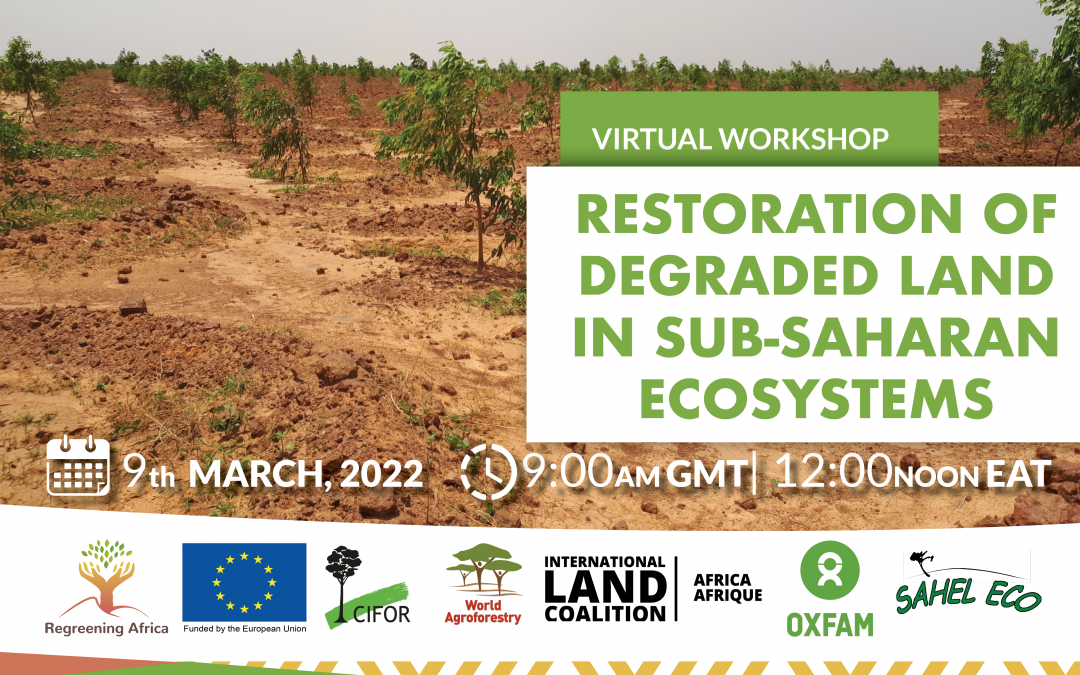TIME: 9:00 am GMT/12 noon EAT
Restoration of degraded land in Sub-Saharan ecosystems
Degradation of ecosystems has emerged as a major concern for policymakers in Sub-Saharan Africa. Up to 65 percent of Africa’s productive land is estimated to be degraded, exacerbating poverty, food and nutritional insecurity, biodiversity loss, conflicts, and insecurity. Restoring degraded ecosystems has the potential to boost food and nutritional security, sequester carbon, and reverse biodiversity loss.
In this workshop, restoration of degraded land in Sub-Saharan ecosystems, the status of land degradation and its drivers in Sub-Saharan ecosystems, as well as best practices and successful experiences based on indigenous local knowledge and science-based evidence for upscaling ecosystem restoration and conservation.
Furthermore, the forum will discuss sustainable territorial and ecosystem management, as well as appropriate policies and approaches for ecosystem restoration and conservation. Such information would encourage the adoption of landscape restoration initiatives in rural communities, particularly among indigenous people, women, and youth.
The event’s outcomes will have an impact on global agendas such as the UN Decade on Ecosystem Restoration on African ecosystems, as well as attract more resources and institutions dedicated to ecosystem restoration and conservation.
OBJECTIVES
- Share some of the best practices and successes realized in terms of policy changes, at global, regional, and national levels on ecosystem restoration.
- Get information and ideas promoting ‘global’ ecosystems restoration and conservation, and
- Identify key stakeholders/partners that adhere to the restoration and conservation of ecosystems.
EXPECTED OUTCOMES
- Best approaches for successful changes in policies and laws of restoration – beneficiaries
- Best practices based on successful stories by Regreening – lessons learnt for scaling-up
- Key changes in policies and laws in the management of trees on-farms/ecosystems
- New members adhering to CBI-6 and new donors engaged.
AGENDA
| TOPIC | SPEAKER | TIME | |
| Welcome | Mamadou Fotigui Coulibaly (Oxfam) and Mieke Bourne (Regreening Africa) | 5 Minutes | |
| Video | 5 Minutes | ||
| Dynamics of degradation in different ecosystems in Sub-Saharan Africa | Ibrahim Toure | 10 Minutes | |
| Climate variability and change through ecosystem restoration and conservation | Kapoury Sanogo | 10 Minutes | |
| Panel discussion: Regreening Changes and Challenges in Mali, Niger, Ethiopia, Zimbabwe | Pierre Dembele, Hamed Tchibozo, Assefa Tofu and Rodger Mpande | 15 Minutes | |
| Community rights-based conservation approaches -Approach in the restoration/conservation of ecosystems | Laure Tall | 10 Minutes | |
| Policies/Changes in the Trees on-farms management in the Regreening Africa ecosystems | Mawa Karambiri | 10 Minutes | |
| Regreening Africa achievements– Best practices and learning | Mieke Bourne | 15 Minutes | |
| General discussion | ALL | 20 Minutes | |
| BREAK (5 MINUTES) | |||
| Working Groups | Coulibaly Mamadou Fotigui | ||
| Group 1 |
Best rights-based conservation approaches for policy changes in ecosystems restoration
|
30 Minutes |
|
| Group 2 | Best practices for scaling up into ecosystems | ||
| Group 3 | Cross-learnings, what is needed for scaling? | ||
| Report in Plenary | 20 Minutes | ||
| Closing remarks | |||
| Summary of the Workshop | Antoine Kalinganire/Ibrahim Toure |
10 Minutes |
|
| Closing words | Audace Kubwimana | ||

